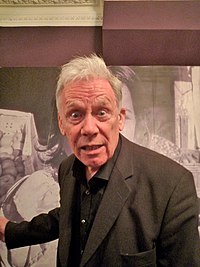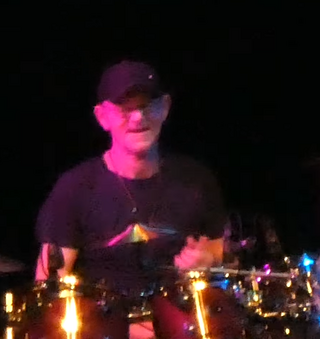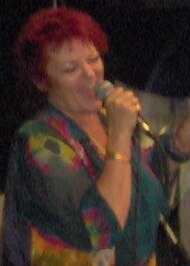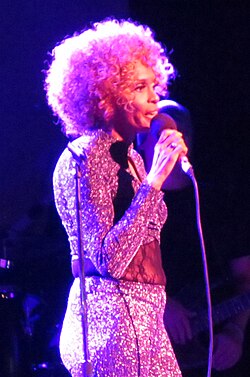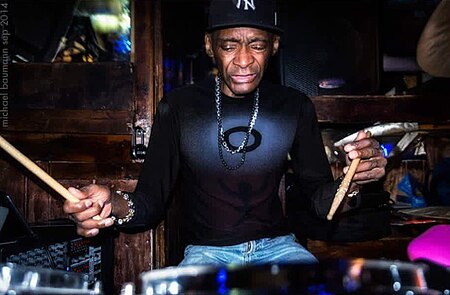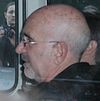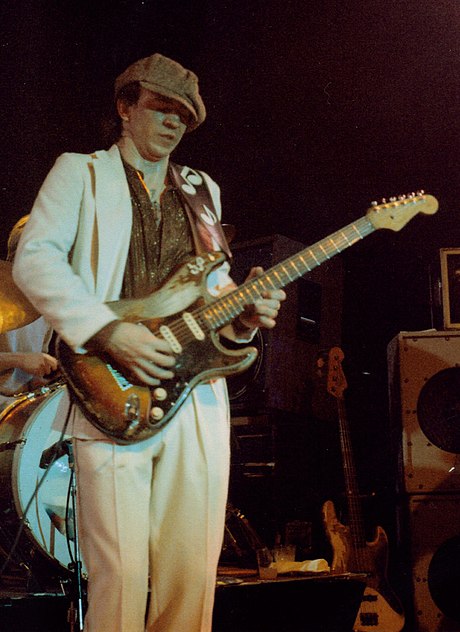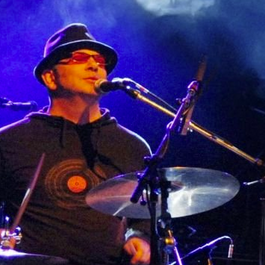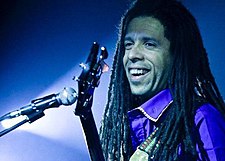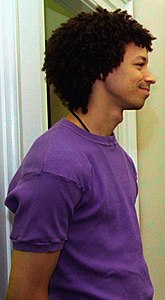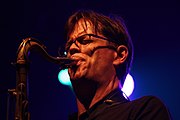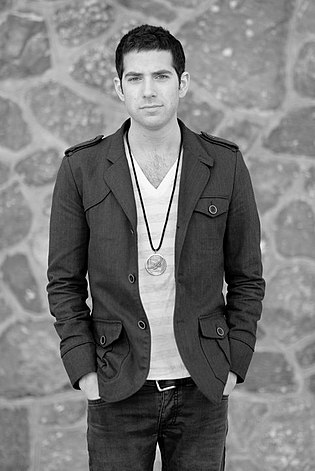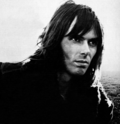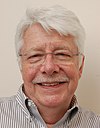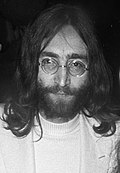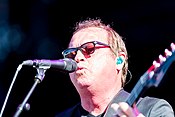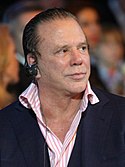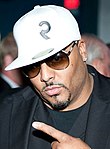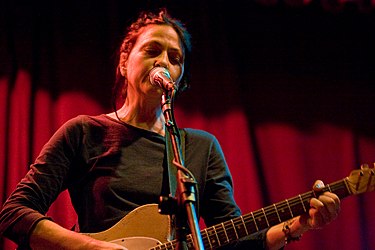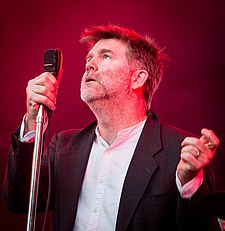List of David Bowie band members
David Bowie was an English singer-songwriter and musician who started his career as a member of a band called the Konrads, under the name David or Davie Jones, in 1962.[1] Since starting his solo career in 1964, his solo band has gone under many names, including, the Hype, Arnold Corns, the Spiders from Mars and Tin Machine. At the time of his retirement from solo live performances in 2004, his band included himself on vocals, guitars, stylophone and harmonica, Earl Slick on guitar, Gerry Leonard on guitar, keyboards and vocals, Gail Ann Dorsey on bass guitar and vocals, Sterling Campbell on drums, Mike Garson on piano and keyboards and Catherine Russell on keyboards, percussion, guitar and vocals.
History
[edit]1960s and 70s
[edit]Bowie formed his first band, the Konrads, in 1962 at the age of 15 under his birth name David Jones. Konrads playing guitar-based rock and roll at local youth gatherings and weddings, the Konrads had a varying line-up of between four and eight members. Bowie's childhood friend, George Underwood among them,[1] as well as drummer Dave Crook and guitarist Neville Wills. Later members of the Konrads included drummer Dave Hadfield, bassist Rocky Shahan and vocalists Roger Ferris and Christine & Stella Patton, He left the Konrads after disagreements over musical styles while recording.[2]
Following the Konrads he was a member of a trio called the Hooker Brothers, or Dave's Reds and Blues with Underwood on guitar and harmonica, Bowie (still under the name Davie Jones) on vocals and saxophone and drummer Viv Andrews. This band existed from July to November 1963.[3] He started his solo career in with the single "Liza Jane" which was credited to Davie Jones with the King Bees,[4][5] a band which included Jones and Underwood and also lead guitarist Roger Bluck, bassist Dave Howard and drummer Robert Allen.[6]
Jones next band was the Manish Boys which included Johnny Flux on guitar, Paul Rodriguez on tenor saxophone and trumpet, Woolf Byrne on baritone saxophone, Bob Solly on keyboards, John Watson on bass guitar and Mick White on drums. Jones left this band in February 1966, this band released the single "I Pity the Fool" which featured Jimmy Page on lead guitar.[7]
Jones joined a band called the Lower Third in early 1965,[8] the band included Denis "Tea-Cup" Taylor on lead guitar, Graham Rivens on bass guitar and Les Mighall on drums. Mighall later left the band and was replaced by Phil Lancaster. The band fell apart later that year.[9] Jones changed his stage name to David Bowie to disambiguate himself from Davy Jones on The Monkees.[10] Under his new moniker, he started a band called David Bowie and the Buzz, in 1966, the core members of the Buzz were bass guitarist Derek "Dek" Fearnley, keyboard player Derek "Chow" Boyes, and drummer John "Ego" Eager,[11] with earlier guitarists being John Hutchinson[12] and Billy Bray. The band later broke up in November of the same year.[13] The Lower Third contributed to Bowie self-titled debut album in 1967, alongside session musician Big Jim Sullivan.[14][15]
In early 1967 Bowie joined The Riot Squad, which consisted of Bowie (vocal, guitar, mouth-harp), Rod "Rook" Davies (lead guitar), Brian "Croak" Prebble (bass, vocals), Bob Evans (tenor saxophone, flute, vocals), George "Butch" Davis (keyboards) and Derek "Del" Roll (drums).[16] The band broke up later that year after recording several songs including a cover of the Velvet Underground's "I'm Waiting for the Man".[17]

In May 1968, Bowie performed on John Peel's Top Gear, with a backing band called the Tony Visconti Orchestra, which included Herbie Flowers (bass), Barry Morgan (drums), John McLaughlin (guitar), Alan Hawkshaw (keyboards) and Visconti and Steve Peregrin Took (backing vocals). This performance was released on the album Bowie at the Beeb in 2000.[18]
Following his stint with The Riot Squad, Bowie formed folk influenced trio Turquoise, with himself, Hermione Farthingale, and former Misunderstood guitarist Tony Hill in September 1968.[19] The band was later renamed to Feathers following Tony Hill being replaced by former Buzz guitarist John "Hutch" Hutchinson, and later to just David Bowie & Hutch after Farthingale's departure.[19]
Bowie released his second self-titled album in 1969, the album included Junior's Eyes members, guitarists Tim Renwick (who also played woodwind) and Mick Wayne bassist John "Honk" Lodge and drummer John Cambridge, other musicians who played on this album were, guitarist Keith Christmas, keyboardist Rick Wakeman, bassists Tony Visconti (who also played woodwind and was the producer) and Herbie Flowers, harmonicist Benny Marshall and cellist and arranger Paul Buckmaster.[20][21] The members of Junior's Eyes also performed with Bowie on the Dave Lee Travis Show in October 1969, prior to the albums release, the recording was also released on Bowie at the Beeb in 2000.[18]
In January 1970 Bowie played on Scottish TV show Cairngorm Ski Night, with producer/bassist Tony Visconti, and percussionist Tex Johnson.[22] Bowie's next backing band was called the Hype, it included originally included guitarist Mick Ronson, bassist Tony Visconti and drummer John Cambridge.[23] This line-up appeared on The Sunday Show introduced by John Peel in February 1970 and on Sounds of the 70s: Andy Ferris in April 1970,[18] before Cambridge was replaced by Mick "Woody" Woodmansey, this line-up appeared on Bowie's third album The Man Who Sold the World with Ralph Mace on Moog. The band was occasionally joined by Mark Pritchett on guitar. one performance on In Concert with John Peel was billed as David Bowie and friends and also included Pritchett, backing vocalists George Underwood, Dana Gillespie and Geoffrey Alexander and also bassist Trevor Bolder.[18] All performances were included on Bowie at the Beeb.[18]

Bowie's next backing band included guitarist Mick Ronson, bassist Bolder and drummer Woodmansey from his David Bowie and Friends band. The band was also augmented by pianists Rick Wakeman and Tom Parker, for some shows each. The then unnamed band was later named the Spiders from Mars and was going to included Wakeman but he declined and joined Yes.[24] The band contributed to Bowie's album The Rise and Fall of Ziggy Stardust and the Spiders from Mars, the band was later augmented by various pianists in 1972, including Nicky Graham,[25] Matthew Fisher,[26] Robin Lumley[26] and Mike Garson[27] (who would be a long-time member of the Bowie band). Into 1973, the band was later augmented by Garson, backing vocalist Warren Peace, rhythm guitarist John Hutchinson and saxophonists Ken Fordham and Brian Wilshaw,[28] this line-up contributed to the album Aladdin Sane in 1973, alongside backing vocalists Linda Lewis and Juanita "Honey" Franklin.[29][30] Most musicians from the Spiders From Mars contributed to Bowie's musical, The 1980 Floor Show in October 1973,[31] and his album Pin Ups in the same month.[32][33]
Bowie's Diamond Dogs, featured keyboardist Mike Garson, bassist Herbie Flowers, drummers Ansley Dunbar and Tony Newman and guitarist Alan Parker.[34][35] For the Diamond Dogs Tour in 1974, he employed an entirely different band with only Garson and Peace being retained.[36] Other members included keyboardist Michael Kamen, guitarist Earl Slick, saxophonists David Sanborn and Richard Grando, returning bassist Herbie Flowers, percussionists Tony Newman and Pablo Rosario and new backing vocalist Gui Andrisano,[37] this tour band existed between June and July and featured on the live album David Live, in September the band was expanded with new guitarist Carlos Alomar (who played alongside Slick and also acted as musical director), bassist Doug Rauch and drummer Greg Errico,[37] as well as backing vocalists Ava Cherry, Robin Clark, Anthony Hinton, Diane Sumler and Luther Vandross.[37]
Between October and December, in a tour called The Soul/Philly Dogs Tour, the band included new members Emir Ksasan (bass) and Dennis Davis (drums) with Kamen, Rauch, Errico and Andrisano departing.[37] Various musicians from this tour contributed to Young Americans, as well as a guest appearance from John Lennon.[38][39] Bowie's next album, Station to Station (1976), included touring members Carlos Alomar, Earl Slick, Dennis Davis and Warren Peace, as well as George Murray (bass guitar), Roy Bittan (piano, organ) and Harry Maslin (melodica, synthesiser, vibraphone, baritone sax).[40][41] Bowie's new tour, Isolar, it included guitarist Carlos Alomar, Stacy Heydon, bassist George Murray, drummer Dennis Davis and keyboardist Tony Kaye.[42]
Low (1977) included Alomar, Davis and Murray and session contributors Brian Eno, Ricky Gardiner, Roy Young, Eduard Meyer, J. Peter Robinson and Paul Buckmaster and guests Iggy Pop and Mary Visconti.[43][44] Similar personnel contributed to "Heroes" (1977) and guest musicians Robert Fripp (King Crimson) and Tony Visconti (producer).[45][46]
The touring rebooted in 1978 as the Isolar II tour, It included a slightly different band, included the returning Alomar, Davis and Murray, with new members Adrian Belew (lead guitar), Roger Powell (keyboards, synthesizer; who was replaced by Dennis Garcia for shows in November), pianist Sean Mayes and violinist Simon House.[47] This was Bowie's last tour of the 70s, some performances were released on Stage.[48] Many musicians from this tour contributed to Lodger (1979).
1980s to 2000s
[edit]Scary Monsters (and Super Creeps) (1980) included Davis, Murray and Alomar.[49][50] Following the release of Scary Monsters (and Super Creeps), Bowie was expected to tour; however, the murder of John Lennon in December 1980 made Bowie cancel tour plans.[51][52] His first tour in 5 years, the Serious Moonlight Tour, kicked off in May 1983. The band included returning members Carlos Alomar and Earl Slick, and also bassist Carmine Rojas, drummer Tony Thompson, keyboardist Dave Lebolt, woodwind players Steve Elson, Stan Harrison and Lenny Pickett and backing vocalists George and Frank Simms.[53]
Let's Dance (1983) included some touring members, including Carmine Rojas, Tony Thompson, Stan Harrison, Steve Elson, George and Frank Simms, and also guest lead guitarist Stevie Ray Vaughan, bassist Bernard Edwards, percussionists Omar Hakim and Sammy Figueroa, keyboardist Robert Sabino, saxophonist Robert Aaron, trumpeter Mac Gollehon and backing vocalist David Spinner. The album was produced by Nile Rodgers who also played guitar on the album.[54] Similar personnel contributed to Tonight (1984).[55][56]
Bowie performed at Live Aid on 15 July 1985 at Wembley Stadium, with a band including guitarist Kevin Armstrong, keyboardist Thomas Dolby, saxophonist Clare Hirst, bassist Matthew Seligman, percussionists Neil Conti and Pedro Ortiz, and backing vocalists Tessa Niles and Helena Springs.[57][58] Never Let Me Down (1987) included mainly touring personnel with some session musicians.[59]
The Glass Spider Tour started in May 1987 and concluded in November, the tour band included guitarist Peter Frampton and Carlos Alomar, bassist Carmine Rojas, drummer Alan Childs and multi-instrumentalists Erdal Kızılçay (keyboards, trumpet, congas, violin, backing vocals) and Richard Cottle (keyboardist, saxophone, tambourine, backing vocals).[60]
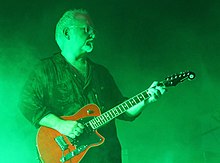
Bowie was a member of hard rock outfit Tin Machine from 1988 to 1992, the band also included Reeves Gabrels (lead guitar, backing vocals), Tony Fox Sales (bass guitar, backing vocals) and Hunt Sales (drums, backing vocals). They released two albums and toured in support of each, on their first tour, from June to July 1989, they were augmented by Kevin Armstrong (rhythm guitar, backing vocals)[61] and by Eric Schermerhorn on their second tour from October 1991 to February 1992.[62]
Between Tin Machine's two tours, Bowie embarked on the Sound+Vision Tour between March and September 1990. The tour band included returning members Adrian Belew and Erdal Kızılçay (now on bass), as well as new members Rick Fox (keyboards) and Michael Hodges (drums).[63] Black Tie White Noise (1993) included various session musicians, including guest lead guitar from Spiders from Mars guitarist Mick Ronson,[64][65] who died later that year.[66] The Buddha of Suburbia (1993) included only Bowie and Kızılçay as well as some contributions from members of the band 3D Echo ((Rob Clydesdale, Gary Taylor, Isaac Daniel Prevos)t, Mike Garson and Lenny Kravitz.[67][68]
Outside (1995) included many past, present and future touring members.[69][70] His next tour was the Outside Tour between September 1995 and September 1996. The tour band was larger than the Sound+Vision band, it included the returning Carlos Alomar, Mike Garson and George Simms (now on keyboards) as well as Tin Machine guitarist Reeves Gabrels and new members Gail Ann Dorsey (bass guitar, vocals), Zack Alford (drums) and Peter Schwartz (synthesizer).[71]
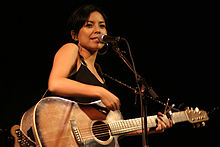
Earthling (1997) featured only touring personnel.[72][73] The Earthling Tour included only retained members Gabrels, Dorsey, Alford and Garson, it ran from June to November 1997.[74] Hours (1999) also included mainly touring personnel,[75][76] the Hours Tour, included lead guitarist Page Hamilton, rhythm guitar Mark Plati, bassist Gail Ann Dorsey, drummer Sterling Campbell, keyboardist Mike Garson and backing vocalists Holly Palmer and Emm Gryner.[77] Reeves Gabrels performed at one show on the tour before being replaced by Hamilton due to personal differences.[78] The tour ran between October and December 1999.
The Mini Tour included only four dates, all in June 2000, and featured the same tour band except Hamilton, who was replaced by the returning Earl Slick.[79] It included a show at Glastonbury which was later described as "iconic".[80] Heathen (2002) included various session musicians, including longtime producer Tony Visconti drummer Matt Chamberlain, guitarist David Torn, violinist Lisa Germano, bassist Tony Levin, and guest guitarists Pete Townshend (The Who) and Dave Grohl (Foo Fighters).[81][82] Around this time, music that was later released on Toy (2019) was recorded.[83]
Bowie's next tour was the Heathen Tour, between June and October 2002, which included a similar band except Palmer and Gryner departed and Catherine Russell (keyboards, percussion, backing vocals) and Gerry Leonard (guitar, keyboards, backing vocals) joined.[84] Reality (2003) included all of his touring band as well as David Torn, Visconti, Chamberlain Mario J. McNulty and Carlos Alomar. Bowie's final tour, A Reality Tour, included the same band as his previous tour, it started in October 2003 and concluded in June 2004.[85]
Following the conclusion of this tour, Bowie did three more live performances. First was at Condé Nast Fashion Rocks on 8 September 2005, which featured three songs first was "Life on Mars" with piano backing from Mike Garson, and the last two were "Wake Up" and "Five Years", both with Indie rock band Arcade Fire.[86] Next was with David Gilmour at the Royal Albert Hall in May 2006 where he performed on Pink Floyd songs "Arnold Layne" and "Comfortably Numb".[87] His final performance was at the Hammerstein Ballroom, NYC as part of the Keep a Child Alive's annual Black Ball fundraiser, where he performed "Wild Is The Wind" (with Mike Garson), "Fantastic Voyage" (with Alicia Keys’' band) and "Changes" (with Alicia Keys).[88] He even announced a comeback gig in 2007 as part of New York's High Line festival, but it was cancelled a few months later without explanation.[88]
Bowie releases two more studio albums The Next Day (2013) and Blackstar (2016) the former included former touring members and other guests,[89] the latter included session musicians Donny McCaslin (woodwind), Jason Lindner (keyboards), Tim Lefebvre (bass), Mark Guiliana (drums), Ben Monder (guitar), James Murphy (percussion) and Erin Tonkon (backing vocals). the album was co-produced with longtime collaborator Tony Visconti.[90] It was his final album released in this lifetime, following his death in January 2016. Various posthumous live albums and a studio album, called Toy, have been released following his death.
Members
[edit]| Image | Name | Years active | Instruments | Release contributions |
|---|---|---|---|---|
| David Bowie (David Jones) | 1962–2016 (until his death) |
| all releases | |
| Neville Wills | 1962–1963 (only with The Konrads) (died 1981) | guitar | none | |
| George Underwood |
|
|
| |
| Dave Cook | 1962 (only with The Konrads) | drums | none | |
| Dave Hadfield | 1962–1963 (only with The Konrads) | |||
| Roger Ferris | vocals | |||
| Christine Patton | ||||
| Stella Patton | ||||
| Alan Dodds | rhythm guitar | |||
| Rocky Shahan | bass guitar | |||
| Viv Andrews | 1963–1964 (only with The Hooker Brothers/Dave’s Reds and Blues) | drums | ||
| Robert Allen | 1964 (only with the King Bees) | "Liza Jane" (1964) | ||
| Dave Howard | bass guitar | |||
| Roger Bluck | lead guitar | |||
| Johnny Flux (Johnny Edward) | 1964–1965 (only with The Manish Boys) (died 2021) | "I Pity the Fool" (1965) | ||
| Bob Solly | 1964–1965 (only with The Manish Boys) (died 2016)[91] | keyboards | ||
| Paul Rodriguez | 1964–1965 (only with The Manish Boys) |
| ||
| Woolf Byrne | baritone saxophone | |||
| John Watson | bass guitar | |||
| Mick White | drums | |||
| Denis Taylor | 1965–1966 (only with the Lower Third) | guitar |
| |
| Graham Rivens | bass guitar | |||
| Les Mighall | 1965 (only with the Lower Third) (died 2008)[92] | drums | none | |
| Phil Lancaster | 1965–1966 (only with the Lower Third) |
| ||
| John Eager | 1966–1967 (only with the Buzz) |
| ||
| Derek Boyes | keyboards | |||
| Derek "Dek" Fearnley | 1966–1967 (only with the Buzz) (died 2008)[93] | bass guitar | ||
| John Hutchinson |
|
|
| |
| Billy Gray | 1966 (only with the Buzz) | guitar | "I Dig Everything" (1966) | |
| Big Jim Sullivan | 1966–1967 (session) (died 2012) |
| David Bowie (1967) | |
| Rod "Rook" Davis | 1967 (only with The Riot Squad) | guitar | "Gotta Be a First Time" / "Bittersweet Love" (1967) | |
| Bob Evans |
| |||
| George Butcher | keyboards | |||
| Brian "Croke" Prebble |
| |||
| Derek "Del" Roll | drums | |||
| Tony Visconti |
|
|
| |
| Herbie Flowers |
| bass guitar |
| |
| John McLaughlin | 1968 (one off) | guitar |
| |
| Barry Morgan | 1968 (one off) (died 2007) | drums | ||
| Steve Peregrin Took | 1968 (one off) (died 1980) |
| ||
| Alan Hawkshaw | 1968 (one off) (died 2021) | keyboards | Bowie at the Beeb (2000) | |
| Hermione Farthingale | 1968–1969 (as Turquoise and Feathers) |
| none | |
| Tony Hill | 1968 (as Turquoise) (died 2022) |
| ||
| John Cambridge | 1969–1970 | drums |
| |
| Mick Wayne | 1969–1970 (only with Junior's Eyes) (died 1994) | guitar | ||
| Tim Renwick | 1969–1970 (only with Junior's Eyes) |
| ||
| John "Honk" Lodge | bass guitar | |||
| Keith Christmas | 1969 (session) | acoustic guitar | David Bowie (1969) | |
| Terry Cox | drums | |||
| Paul Buckmaster |
|
|
| |
| Ralph Mace | 1970 (session) | Moog synthesiser | The Man Who Sold the World (1970) | |
| Tex Johnson | 1970 (touring) |
| none | |
| Mick Ronson |
|
|
| |
| Mick "Woody" Woodmansey |
| drums |
| |
| Mark Carr-Pritchett |
|
| Bowie at the Beeb (2000) | |
| Benny Marshall | 1970 |
| David Bowie (1969) | |
| Rudi Valentino (Freddie Burretti) (stand in) | 1971 (only with Arnold Corns) (died 2001)[95] | vocals | none | |
| Tim Broadbent | 1971 (only with Arnold Corns) | drums | ||
| Pete De Somogyl | bass guitar | |||
| Trevor Bolder | 1971–1973 (died 2013) |
|
| |
| Rick Wakeman |
| piano |
| |
| Warren Peace (Geoffrey Alexander MacCormack) |
|
|
| |
| Dana Gillespie | 1971 (one off) | backing vocals |
| |
| Tom Parker | 1971 (one off) (died 2013) | piano | none | |
| Nicky Graham | 1972 (touring) (died 2024) | Bowie at the Beeb (2000) | ||
| Matthew Fisher | 1972 (touring) | none | ||
| Robin Lumley | 1972 (touring) (died 2023) | |||
| Mike Garson |
|
|
| |
| Juanita "Honey" Franklin | 1972–1973 (session) | backing vocals | Aladdin Sane (1973) | |
| Linda Lewis | 1972–1973 (session) (died 2023) | |||
| Ken Fordham | 1973 | saxophone |
| |
| Brian Wilshaw |
|
| ||
| Aynsley Dunbar | 1973–1974 | drums |
| |
| Ava Cherry |
| vocals |
| |
| Jason Guess | 1973 | none | ||
| Earl Slick (Frank Madeloni) |
| lead guitar |
| |
| Michael Kamen | 1974 (touring) (died 2003) |
| David Live (1974) | |
| Pablo Rosario | 1974 (touring) | percussion |
| |
| David Sanborn | 1974 (touring) (died 2024) |
|
| |
| Richard Grando | 1974 (touring) |
| ||
| Gui Andrisano | backing vocals | |||
| Tony Newman | 1974 | drums | Diamond Dogs (1974) | |
| Carlos Alomar |
|
|
| |
| Doug Rauch | 1974 (touring) (died 1979) | bass guitar | Cracked Actor (Live Los Angeles '74) (2017) | |
| Greg Errico | 1974 (touring) | drums | ||
| Robin Clark |
| backing vocals |
| |
| Anthony Hinton | 1974 |
| ||
| Diane Sumler | ||||
| Luther Vandross | 1974 (died 2005) | |||
| Willie Weeks | 1974 (session) | bass guitar | Young Americans (1975) | |
| Andy Newmark | drums | |||
| Dennis Davis | 1974–1980 (died 2016) |
|
| |
| Emir Ksasan | 1974 | bass guitar | Young Americans (1975) | |
| George Murray | 1976–1980 |
|
| |
| Tony Kaye | 1976 (touring) | keyboards | Live Nassau Coliseum '76 (2017) | |
| Stacy Heydon |
| |||
| Brian Eno |
|
| ||
| Ricky Gardiner | 1976 (session) (died 2022) | lead and rhythm guitar | Low (1977) | |
| Roy Young | 1976 (session) (died 2018) |
| ||
| Antonia Maass (Maaß) | 1977 (session) | backing vocals | "Heroes" (1977) | |
| Robert Fripp |
| lead guitar |
| |
| Adrian Belew |
|
|
| |
| Sean Mayes | 1978 (died 1995) |
| ||
| Simon House | 1978 | electric violin | ||
| Roger Powell |
| |||
| Dennis Garcia | 1978 (substitute) | none | ||
| Stan Harrison |
|
|
| |
| Roy Bittan | 1980 (session) | piano | Scary Monsters (and Super Creeps) (1980) | |
| Andy Clark | synthesizer | |||
| Lynn Maitland | backing vocals | |||
| Chris Porter | ||||
| Carmine Rojas |
| bass guitar |
| |
| Steve Elson |
|
|
| |
| George Simms |
|
|
| |
| Frank Simms | 1982–1983 | backing vocals |
| |
| Sammy Figueroa |
| percussion |
| |
| Omar Hakim | drums | |||
| Nile Rodgers |
| guitar |
| |
| David Spinner | 1982 (session) | backing vocals | Let's Dance (1983) | |
| Stevie Ray Vaughan | 1982 (session) (died 1990) | lead guitar | ||
| Robert Sabino | 1982 (session) |
| ||
| Mac Gollehon | trumpet | |||
| Robert Aaron | tenor saxophone | |||
| Tony Thompson | 1982–1983 (died 2003) |
|
| |
| Lenny Pickett |
|
|
| |
| Dave Lebolt | 1983 (touring) |
| Serious Moonlight (1983) | |
| Curtis King |
| backing vocals |
| |
| Derek Bramble | 1984 (session) |
| Tonight (1984) | |
| Guy St. Onge | marimba | |||
| Mark Pender |
| |||
| Arif Mardin | 1984 (session) (died 2006) |
| ||
| Kevin Armstrong |
|
|
| |
| Matthew Seligman | 1985 (one off) (died 2020) | bass guitar | none | |
| Thomas Dolby | 1985 (one off) |
| ||
| Clare Hirst | saxophone | |||
| Neil Conti | drums | |||
| Pedro Ortiz | percussion | |||
| Tessa Niles | backing vocals | |||
| Helena Springs | ||||
| Erdal Kızılçay |
|
|
| |
| Peter Frampton | 1986–1987 |
|
| |
| Philippe Saisse |
|
| Never Let Me Down (1987) | |
| Laurie Frink | 1986 (session) (died 2013) | trumpet | ||
| Earl Gardner | 1986 (session) | flugelhorn | ||
| Errol "Crusher" Bennett | percussion | |||
| Lani Groves | backing vocals | |||
| Diva Gray | 1986 (died 2024) | |||
| Gordon Grody | 1986 | |||
| Richard Cottle | 1987 |
| Glass Spider (2007) | |
| Alan Childs | drums | |||
| Reeves Gabrels |
|
|
| |
| Tony Fox Sales |
|
| all Tin Machine releases | |
| Hunt Sales |
| |||
| Rick Fox | 1990 (touring) |
| none | |
| Michael Hodges | drums | |||
| Eric Schermerhorn | 1991–1992 (touring) |
| Tin Machine Live: Oy Vey, Baby (1992) | |
| Dave Richards | 1992 (session) (died 2013) | keyboards | Black Tie White Noise (1993) | |
| Richard Tee | 1992 (session) (died 1993) | |||
| Richard Hilton | 1992 (session) | |||
| Poogie Bell | drums | |||
| Barry Campbell | bass | |||
| John Regan | 1992 (session) (died 2023) | |||
| Michael Reisman | 1992 (session) |
| ||
| Gerardo Velez | percussion | |||
| Fonzi Thornton | backing vocals | |||
| Tawatha Agee | ||||
| Dennis Collins | ||||
| Brenda White-King | ||||
| Maryl Epps | ||||
| Yossi Fine | 1995 (session) | bass | Outside (1995) | |
| Joey Baron | drums | |||
| Gail Ann Dorsey | 1995–2004 |
|
| |
| Zachary Alford | 1995–1997 |
|
| |
| Peter Schwartz | 1995–1996 (touring) | synthesizer |
| |
| Sterling Campbell |
|
|
| |
| Mark Plati | 1999–2002 (session before hand) |
|
| |
| Holly Palmer | 1999–2000 (touring) |
|
| |
| Emm Gryner |
|
| ||
| Mike Levesque | 1999 (session) |
| Hours (1999) | |
| Page Hamilton | 1999 (touring) | lead guitar | Something in the Air (Live Paris 99) (2020) | |
| Gerry Leonard |
|
|
| |
| David Torn |
|
|
| |
| Matt Chamberlain | 2001–2002 (session) |
|
| |
| Catherine Russell | 2002–2004 |
|
| |
| Donny McCaslin | 2015 (session) |
| Blackstar (2016) | |
| Jason Lindner |
| |||
| Tim Lefebvre | bass | |||
| Mark Guiliana |
| |||
| Ben Monder | guitar |
Timeline
[edit]- Touring/session

- Session

Line-ups
[edit]| Period[97] | Members | Releases |
|---|---|---|
| June – Late 1962 (The Konrads)[2] |
| |
| Late 1962 – Mid 1963 (The Konrads)[2] |
| |
| July – November 1963 (The Hooker Brothers/Dave's Reds and Blues)[3] |
| |
| 1964 (Davie Jones and the King Bees)[6] |
|
|
| 1964/5 |
|
|
| Early 1965 (Davie Jones and the Lower Third)[8] |
| |
| 1965/6 (Davie Jones and the Lower Third)[8] |
|
|
| February – June 1966[100] (David Bowie and the Buzz)[12] |
|
|
| June[101] – November 1966[102] |
|
|
| November – December 1966 |
|
|
| March – May 1967 |
|
|
| May 1968 (as The Tony Visconti Orchestra) |
|
|
| September – November 1968 (Turquoise)[19] |
| |
| November 1968 – March 1969 (Feathers)[104] |
| |
| March 1969 (David Bowie and Hutch)[105] |
| |
| June 1969 – February 1970 (David Bowie with Junior's Eyes) |
|
|
| 1970 (David Bowie)[106] |
| |
| February – April 1970 |
|
|
| April – November 1970 (The Hype)[23] |
|
|
| November 1970 – (The Hype)[23] |
| |
| 1971 |
| |
| 1971[109] |
| none – a line-up that was originally going to play on In Concert: John Peel[109] |
| June 1971 |
|
|
| 1971 |
|
|
| 1972 (David Bowie and the Spiders from Mars Ziggy Stardust Tour) |
| |
| June 1972 (David Bowie and the Spiders from Mars Ziggy Stardust Tour) |
| |
| June – July 1972 (David Bowie and the Spiders From Mars Ziggy Stardust Tour) |
| |
| August – September 1972 (David Bowie and the Spiders From Mars Ziggy Stardust Tour + Sounds of the 70s: John Peel show) |
|
|
| September – December 1972 (David Bowie and the Spiders From Mars Ziggy Stardust Tour) |
|
|
| January – July 1973 (David Bowie and the Spiders From Mars Ziggy Stardust Tour) |
|
|
| October 1973 |
|
|
| January–February 1974 (Sessions) |
|
|
| June–July 1974 |
|
|
| September 1974 |
| |
| August–October 1974 |
|
|
| October–December 1974 (The Soul Tour/Philly Dogs Tour) |
|
|
| February – May 1976 |
|
|
| September–October 1976 (sessions) |
|
|
| July–August 1977 (sessions) |
|
|
| March – November 1978 |
|
|
| November 1978 |
| |
| November – December 1978 |
|
|
| February–April 1980 (sessions) |
| |
| December 1982 (sessions) |
|
|
| May – December 1983 |
|
|
| May–June 1984 (Sessions) |
|
|
| 15 July 1985 |
| |
| September–November 1986 (Session) |
|
|
| May – November 1987 |
| |
| June – July 1989 |
|
|
| March – September 1990 |
| |
| October 1991 – February 1992 |
| |
| April–November 1992 (sessions) |
|
|
| August 1993 |
|
|
| March–November 1994, January–February 1995 |
|
|
| September 1995 – February 1996 |
|
|
| June 1996 – November 1997 (Outside Summer Festivals Tour and Earthling Tour) |
|
|
| April–June 1999 |
|
|
| October – December 1999 |
|
|
| June 2000 |
|
|
| August 2001 – January 2002 (Sessions) |
|
|
| June – October 2002 |
| |
| January–May 2003 (Sessions) |
|
|
| October 2003 – June 2004 |
|
|
Additional session musicians
[edit]Musicians that are either credited as additional personnel or contributed to fewer than 4 tracks on an album.
| Image | Name | Years active | Instrumens | Release contributions |
|---|---|---|---|---|
| Jimmy Page | 1965 | lead guitar | "I Pity the Fool" (1965) | |
| Nicky Hopkins | piano | "You've Got a Habit of Leaving" (1965) | ||
| Shel Talmy | backing vocals | |||
| Leslie Conn | ||||
| Glyn Johns | ||||
| Tony Hatch | 1965–1966 |
|
| |
| Chick Norton | 1966 | trumpet | "Rubber Band" (1966) | |
| Gus Dudgeon | 1967 (died 2002) | gnome vocal | "The Laughing Gnome" (1967) | |
| Peter Hampshire | 1967 | guitar | ||
| John Renbourn | 1967 (died 2015) | acoustic guitar | "Love You till Tuesday" (1967) | |
| Marion Constable | 1966–1967 | backing vocals | David Bowie (1967) | |
| Arthur Greenslade | 1966–1967 (died 2003) | arrangements | ||
| Andy White | 1966–1968 (died 2015) | drums | The World of David Bowie (1970) | |
| Godfrey McLean | 1970 | "The Prettiest Star" (1970) | ||
| Ken Scott | 1971 | ARP synthesiser | Hunky Dory (1971)[96] | |
| Alan Parker | 1974 | guitar | Diamond Dogs (1974) | |
| John Lennon | 1974–1975 (died 1980) |
| Young Americans (1975) | |
| Ralph MacDonald | 1974–1975 (died 2011) | percussion | ||
| Larry Washington | 1974–1975 (died 1999) | congas | ||
| Jean Fineberg | 1974–1975 | backing vocals | ||
| Jean Millington | ||||
| Harry Maslin | 1975 |
| Station to Station (1976) | |
| Iggy Pop |
| backing vocals | ||
| Mary Visconti | 1976 | Low (1977) | ||
| Eduard Meyer | cellos | |||
| J. Peter Robinson | pianos and ARP | |||
| Pete Townshend |
| guitar |
| |
| Chuck Hammer | 1980 | guitar synthesiser | Scary Monsters (and Super Creeps) (1980) | |
| Michi Hirota | voice | |||
| Mark King | 1984 | bass guitar | Tonight (1984) | |
| Rob Yale | Fairlight CMI | |||
| Tina Turner | 1984 (died 2023) | lead vocals | ||
| Mickey Rourke | 1986 | mid-song rap | Never Let Me Down (1987) | |
| Sid McGinnis | lead guitar | |||
| Wild T. Springer | 1992 | Black Tie White Noise (1993) | ||
| Al B. Sure! | vocal duet | |||
| Lester Bowie | 1992 (died 1999) | trumpet | ||
| Rob Clydesdale | 1993 |
| The Buddha of Suburbia (1993) | |
| Gary Taylor | ||||
| Isaac Daniel Prevost | ||||
| Lenny Kravitz | guitar | |||
| Tom Frish | 1994 | additional guitar | Outside (1995) | |
| Bryony Edwards | background vocals | |||
| Lola Edwards | ||||
| Josey Edwards | ||||
| Ruby Edwards | ||||
| Everett Bradley | 1999 | percussion | Hours (1999) | |
| Chris Haskett | rhythm guitar | |||
| Marcus Salisbury | bass guitar | |||
| Lisa Germano | 2000–2002 |
|
| |
| Cuong Vu | 2000 | trumpet | Toy (2021) | |
| Tony Levin |
| bass guitar |
| |
| Greg Kitzis | 2001–2002 | first violin | Heathen (2002) | |
| Meg Okura | second violin | |||
| Martha Mooke | viola | |||
| Mary Wooten | cello | |||
| Jordan Rudess | keyboards | |||
| Kristeen Young |
| |||
| Dave Grohl | guitar | |||
| Gary Miller | additional guitar | |||
| John Read | bass | |||
| Solá Ákingbolá | percussion | |||
| Philip Sheppard | electric cello | |||
| Mario J. McNulty | 2003 | additional percussion and drums | Reality (2003) | |
| Janice Pendarvis | 2011–2012 | backing vocals | The Next Day (2013) | |
| Henry Hey | piano | |||
| Maxim Moston | strings | |||
| Antoine Silverman | ||||
| Anja Wood | ||||
| Hiroko Taguchi | ||||
| James Murphy | 2015 | percussion | Blackstar (2016) | |
| Erin Tonkon | backing vocals |
References
[edit]- ^ a b Sandford 1997, p. 28.
- ^ a b c "The Konrads – British Music Archive". Retrieved 16 August 2023.
- ^ a b "fabulousfreaks.uk | The Hooker Brothers". mysite-1. Retrieved 16 August 2023.
- ^ Pegg 2016, pp. 166–167.
- ^ O'Leary 2015, chaps. 1–2.
- ^ a b Unterberger, Richie. "Davie Jones & the King Bees Biography". AllMusic. Retrieved 16 August 2023.
- ^ O'Leary 2015.
- ^ a b c Unterberger, Richie. "The Lower Third Biography". AllMusic. Retrieved 16 August 2023.
- ^ "fabulousfreaks.uk | The Lower Third". mysite-1. Retrieved 16 August 2023.
- ^ Swanson, Dave (12 January 2016). "When David Jones Became David Bowie". Ultimate Classic Rock. Retrieved 17 August 2023.
- ^ "David Bowie ends his partnership with the Buzz | November 1966 | The Bowie Bible". www.bowiebible.com. 25 November 1966. Retrieved 17 August 2023.
- ^ a b c d Unterberger, Richie. "The Buzz Songs, Albums, Reviews, Bio & More". AllMusic. Retrieved 16 August 2023.
- ^ a b c "The Bowie Bible - Live: David Bowie and the Buzz, Playboy Club, London". www.bowiebible.com. 17 July 1966. Retrieved 16 August 2023.
- ^ Pegg 2016, pp. 328–333.
- ^ Cann 2010, pp. 104–107.
- ^ "David Bowie Concerts 1958 to 1969". Bowiewonderworld.com.
- ^ O'Leary 2015, chap. 2.
- ^ a b c d e Bowie at the Beeb (liner notes). EMI Records. 2000. 7243 528629 2 4.
- ^ a b c "fabulousfreaks.uk | Turquoise/Feathers/David Bowie & Hutch". mysite-1. Retrieved 16 August 2023.
- ^ Pegg 2016, pp. 333–337.
- ^ David Bowie [Space Oddity] (CD booklet). David Bowie. UK & Europe: EMI. 2009. 50999-307522-2-1.
{{cite AV media notes}}: CS1 maint: others in cite AV media (notes) (link) - ^ "The Bowie Bible - Television: Cairngorm Ski Night". www.bowiebible.com. 29 January 1970. Retrieved 17 August 2023.
- ^ a b c d Hughes, Rob (15 November 2022). "When Rainbowman met Gangsterman: The story of the gig that invented glam rock". louder. Retrieved 16 August 2023.
- ^ "BBC Four - Prog Rock Britannia: An Observation in Three Movements". BBC. Retrieved 2 May 2019.
- ^ a b "ABOUT". nicky-graham. Retrieved 16 August 2023.
- ^ a b c d Angus, Janet (September 1984). "Robin Lumley - Producer (HSR Sep 84)". www.muzines.co.uk. pp. 26–28. Retrieved 22 December 2018.
- ^ a b "David Bowie pianist Mike Garson talks Ziggy Stardust's last stand ahead of 50th anniversary premiere". www.musicweek.com. 30 June 2023. Retrieved 16 August 2023.
- ^ Pegg 2016, pp. 539–555.
- ^ Pegg 2016, pp. 361–363.
- ^ Aladdin Sane (liner notes). David Bowie. UK: RCA Records. 1973. PK-2134.
{{cite AV media notes}}: CS1 maint: others in cite AV media (notes) (link) - ^ Griffin 2016.
- ^ Pegg 2016, pp. 364–367.
- ^ Pin Ups (liner notes). David Bowie. UK: RCA Records. 1973. RS 1003.
{{cite AV media notes}}: CS1 maint: others in cite AV media (notes) (link) - ^ Pegg 2016, pp. 367–372.
- ^ Diamond Dogs (liner notes). David Bowie. RCA Records. 1974. APLI 0576.
{{cite AV media notes}}: CS1 maint: others in cite AV media (notes) (link) - ^ Sinclair, David (6 December 2022). "David Bowie: The making of Diamond Dogs and the iconic tour that failed". louder. Retrieved 17 August 2023.
- ^ a b c d "David Bowie 1974 Diamond Dogs Tour – DavidBowieWorld.nl". Retrieved 17 August 2023.
- ^ Pegg 2016, pp. 373–379.
- ^ Young Americans (liner notes). David Bowie. RCA Records. 1975. RS 1006.
{{cite AV media notes}}: CS1 maint: others in cite AV media (notes) (link) - ^ Station to Station (liner notes). David Bowie. US: RCA Records. 1976. APL1-1327.
{{cite AV media notes}}: CS1 maint: others in cite AV media (notes) (link) - ^ Pegg 2016, pp. 379–380.
- ^ a b "ISOLAR 1 Tour kicks off 45 years ago tonight". David Bowie. 2 February 2021. Retrieved 16 August 2023.
- ^ Pegg 2016, p. 384.
- ^ Low (CD liner notes). David Bowie. US: Rykodisc. 1991. RCD 10142.
{{cite AV media notes}}: CS1 maint: others in cite AV media (notes) (link) - ^ Pegg 2016, pp. 389–390.
- ^ David Bowie (1977). "Heroes" (liner notes). UK: RCA Records. PL 12522.
- ^ a b c d "ISOLAR 2 Tour kicks off 40 years ago tonight". David Bowie. 29 March 2018. Retrieved 16 August 2023.
- ^ Griffin 2016, chap. 9.
- ^ Pegg 2016, pp. 397–401.
- ^ Scary Monsters (and Super Creeps) (liner notes). David Bowie. UK: RCA Records. 1980. BOW LP 2.
{{cite AV media notes}}: CS1 maint: others in cite AV media (notes) (link) - ^ Pegg 2016, pp. 662–664.
- ^ Buckley 2005, p. 325.
- ^ a b "David Bowie 1983 Serious Moonlight Tour – DavidBowieWorld.nl". 14 January 2022. Retrieved 16 August 2023.
- ^ Let's Dance (liner notes). David Bowie. UK: EMI America Records. 1983. AML 3029.
{{cite AV media notes}}: CS1 maint: others in cite AV media (notes) (link) - ^ Tonight (CD booklet). David Bowie. EMI America Records. 1984.
{{cite AV media notes}}: CS1 maint: others in cite AV media (notes) (link) - ^ Bashe, Philip (January 1985). "The Boy Keeps Swinging". International Musician (Jan 1985): 59–61.
- ^ a b "David Bowie – Live Aid (London 1985)". David Bowie News | Celebrating the Genius of David Bowie. 12 March 2014. Retrieved 16 August 2023.
- ^ Live Aid (21 September 2018). David Bowie - Heroes (Live Aid, 1985). Retrieved 15 January 2025 – via YouTube.
- ^ Never Let Me Down (CD booklet). David Bowie. EMI America Records. 1987. CDP 7 46677 2.
{{cite AV media notes}}: CS1 maint: others in cite AV media (notes) (link) - ^ Glass Spider (DVD booklet). David Bowie. EMI America Records (Barcode: 0094639100224). 2007.
{{cite AV media notes}}: CS1 maint: others in cite AV media (notes) (link) - ^ a b "An Exclusive Interview With Kevin Armstrong". David Bowie News | Celebrating the Genius of David Bowie. 25 October 2021. Retrieved 16 August 2023.
- ^ "Exclusive Interview with Eric Schermerhorn". David Bowie News | Celebrating the Genius of David Bowie. 6 November 2022. Retrieved 17 August 2023.
- ^ a b "David Bowie – Sound and Vision Tour – 1990". The Fan Club Years. 20 March 1990. Retrieved 16 August 2023.
- ^ Black Tie White Noise (CD booklet). David Bowie. Europe: Arista Records. 1993. 74321 13697 2.
{{cite AV media notes}}: CS1 maint: others in cite AV media (notes) (link) - ^ Pegg 2016, pp. 417–418.
- ^ "Why Hull should honour my Mick". Hull Daily Mail. Archived from the original on 25 October 2015. Retrieved 15 January 2016.
- ^ Pegg 2016, pp. 421–423.
- ^ The Buddha of Suburbia (liner notes). David Bowie. UK: Arista. 1993. 74321 170042.
{{cite AV media notes}}: CS1 maint: others in cite AV media (notes) (link) - ^ Pegg 2016, pp. 423–430.
- ^ 1. Outside (CD booklet). David Bowie. Europe: Arista/BMG/RCA. 1995. 74321303392.
{{cite AV media notes}}: CS1 maint: others in cite AV media (notes) (link) - ^ "David Bowie 1995-1996 Outside Tour – DavidBowieWorld.nl". 12 January 2022. Retrieved 17 August 2023.
- ^ Pegg 2016, pp. 430–433.
- ^ Earthling (CD booklet). David Bowie. US: Virgin Records. 1997. RCA 74321 449442.
{{cite AV media notes}}: CS1 maint: others in cite AV media (notes) (link) - ^ "David Bowie 1997 Earthling Tour – DavidBowieWorld.nl". Retrieved 17 August 2023.
- ^ Pegg 2016, pp. 433–437.
- ^ Hours (CD booklet). David Bowie. Europe: Virgin Records. 1999. 7243 8 48158 2 0.
{{cite AV media notes}}: CS1 maint: others in cite AV media (notes) (link) - ^ "David Bowie 1999 Hours Tour – DavidBowieWorld.nl". Retrieved 17 August 2023.
- ^ Nicholas Pegg, The Complete David Bowie, Reynolds & Hearn Ltd, 2004, ISBN 1-903111-73-0
- ^ "David Bowie 2000 Mini Tour – DavidBowieWorld.nl". Retrieved 17 August 2023.
- ^ Malloy, Tomas; King, Jasper (29 June 2020). "Bowie's Glastonbury set was cut off by the BBC back in 2000". BristolLive. Retrieved 17 August 2023.
- ^ Pegg 2016, pp. 440–450.
- ^ Heathen (liner notes). David Bowie. US: Columbia Records/ISO. 2002. CK 86630.
{{cite AV media notes}}: CS1 maint: others in cite AV media (notes) (link) - ^ Buckley 2005, pp. 488–489.
- ^ Grebin, Janet (24 January 2021). "David Bowie 2002 Heathen Tour – DavidBowieWorld.nl". Retrieved 17 August 2023.
- ^ "A Reality Tour | The Bowie Bible". www.bowiebible.com. 11 January 2017. Retrieved 17 August 2023.
- ^ "David Bowie's final solo performance of 'Life On Mars?'". faroutmagazine.co.uk. 7 December 2020. Retrieved 17 August 2023.
- ^ Whatley, Jack (10 July 2021). "Bowie and Gilmour perform Pink Floyd's 'Comfortably Numb'". faroutmagazine.co.uk. Retrieved 17 August 2023.
- ^ a b Greene, Andy (26 August 2014). "David Bowie Sings 'Changes' at His Last Public Performance". Rolling Stone. Retrieved 17 August 2023.
- ^ The Next Day (deluxe edition liner notes). David Bowie. ISO/Columbia Records. 2013. 88765 46192 2.
{{cite AV media notes}}: CS1 maint: others in cite AV media (notes) (link) - ^ Blackstar (album liner notes). David Bowie. ISO Records. 2016. 88875173862.
{{cite AV media notes}}: CS1 maint: others in cite AV media (notes) (link) - ^ "R.I.P Bob Solly". David Bowie. 13 January 2020. Retrieved 18 August 2023.
- ^ @bowieww (10 March 2016). "Birthday memories of Les Mighall (The Lower Third original drummer) (Born 10th March 1943 - 11th March 2008)" (Tweet). Retrieved 18 August 2023 – via Twitter.
- ^ "R.i.p. Derek Fearnley". David Bowie. 12 November 2008. Retrieved 18 August 2023.
- ^ Gallagher, Alex (26 July 2021). "David Bowie collaborator, guitarist John Hutchinson, has died". NME. Retrieved 18 August 2023.
- ^ Mallon, Jackie (27 January 2016). "Fashion's Unsung Designers; Bowie's Freddie Burretti". FashionUnited. Retrieved 12 November 2023.
- ^ a b O'Leary 2015, chap. 5.
- ^ "David Bowie's live band personnel, 1962-2006 | The Bowie Bible". www.bowiebible.com. 23 July 2018. Retrieved 16 August 2023.
- ^ Unterberger, Richie. "The Manish Boys Biography". AllMusic. Retrieved 16 August 2023.
- ^ Smith, Alan (6 December 2021). "Bowie remembered through his Kent gigs". Kent Online. Retrieved 16 August 2023.
- ^ "John 'Hutch' Hutchinson leaves the Buzz | June 1966 | The Bowie Bible". www.bowiebible.com. 15 June 1966. Retrieved 18 August 2023.
- ^ "The Bowie Bible - The Buzz audition guitarists". www.bowiebible.com. 16 June 1966. Retrieved 18 August 2023.
- ^ "The Bowie Bible - Live: David Bowie and the Buzz, Community Centre, Gosport". www.bowiebible.com. 26 November 1966. Retrieved 18 August 2023.
- ^ "David Bowie Concerts 1958 to 1969". Bowiewonderworld.com.
- ^ Unterberger, Richie. "The Feathers Songs, Albums, Reviews, Bio & More". AllMusic. Retrieved 16 August 2023.
- ^ Owen, Matt (26 July 2021). "John "Hutch" Hutchinson, guitarist for David Bowie, has died". guitarworld. Retrieved 16 August 2023.
- ^ "The Bowie Bible - Live: Aberdeen University". www.bowiebible.com. 30 January 1970. Retrieved 16 August 2023.
- ^ Cann, Kevin (28 February 2011). David Bowie: Any Day Now: The London Years 1947-1974. Adelita. ISBN 9780955201776.[page needed]
- ^ Pegg, Nicholas (2000). The Complete David Bowie. Reynolds & Hearn Ltd. ISBN 1-903111-14-5.[page needed]
- ^ a b David Bowie - BBC Radio 'In Concert' Jeff Griffin & Trevor Bolder interview., 25 October 2014, retrieved 4 November 2023
- ^ Cann, Kevin (28 February 2011). David Bowie: Any Day Now: The London Years 1947-1974. Adelita. ISBN 9780955201776.[page needed]
- ^ Pegg, Nicholas (2000). The Complete David Bowie. Reynolds & Hearn Ltd. ISBN 1-903111-14-5.[page needed]
- ^ Purden, Richard (10 April 2019). "Mick Ronson was the best guitarist David Bowie ever had". Guitar.com | All Things Guitar. Retrieved 16 August 2023.
- ^ "David Bowie 1971-09-25 Aylesbury ,Borough Assembly Rooms (Friars) – Aylesbury 1971 – SQ 8,5 – DavidBowieWorld.nl". Retrieved 16 August 2023.
- ^ Fortnam, Ian (6 July 2022). "David Bowie and the most influential three minutes and 55 seconds of UK TV ever". louder. Retrieved 24 February 2025.
- ^ "Bowie Golden Years : 1980 Floor Show". www.bowiegoldenyears.com. Retrieved 16 August 2023.
- ^ Walter, John (24 July 2021). "David Bowie 1987 Glass Spider Tour – DavidBowieWorld.nl". Retrieved 16 August 2023.
- ^ Guest performer during some North American/Australian shows
- Sandford, Christopher (1997) [First published 1996]. Bowie: Loving the Alien. London: Time Warner. ISBN 978-0-306-80854-8.
- Buckley, David (2005) [1999]. Strange Fascination – David Bowie: The Definitive Story. London: Virgin Books. ISBN 978-0-75351-002-5.
- Pegg, Nicholas (2016). The Complete David Bowie (Revised and Updated ed.). London: Titan Books. ISBN 978-1-78565-365-0.
- O'Leary, Chris (2015). Rebel Rebel: All the Songs of David Bowie from '64 to '76. Winchester: Zero Books. ISBN 978-1-78099-244-0.
- Cann, Kevin (2010). Any Day Now – David Bowie: The London Years: 1947–1974. Croydon, Surrey: Adelita. ISBN 978-0-9552017-7-6.
- Griffin, Roger (2016). David Bowie: The Golden Years. London: Omnibus Press. ISBN 978-0-85712-875-1.


 French
French Deutsch
Deutsch



